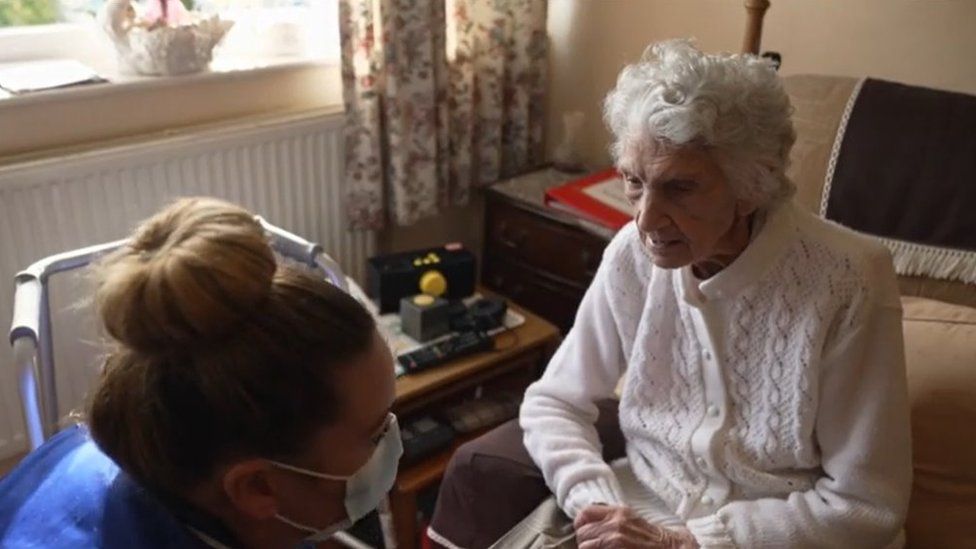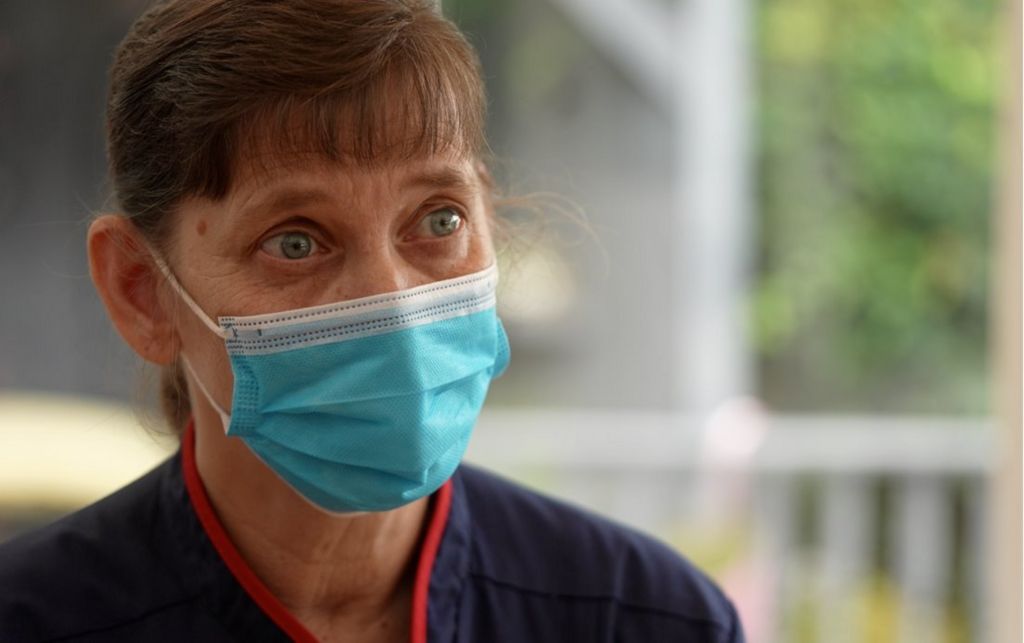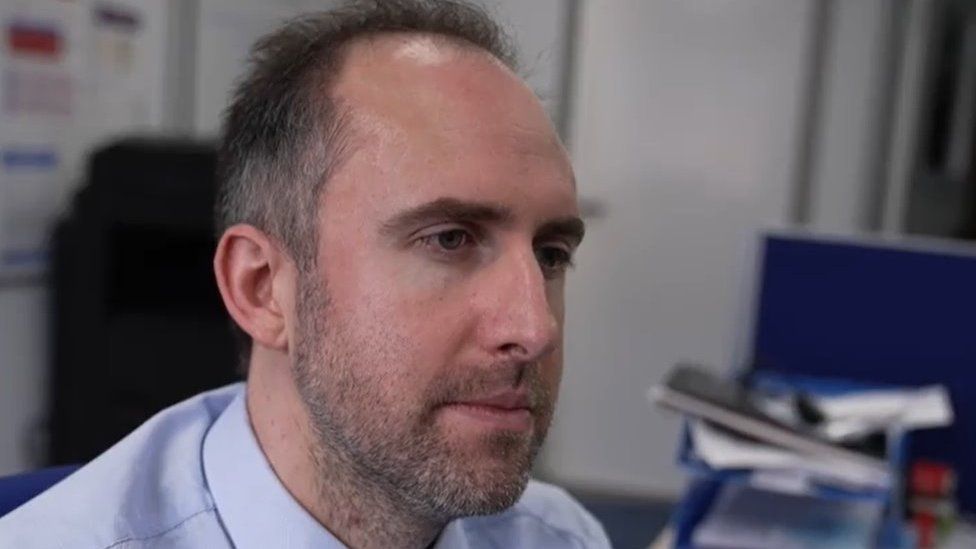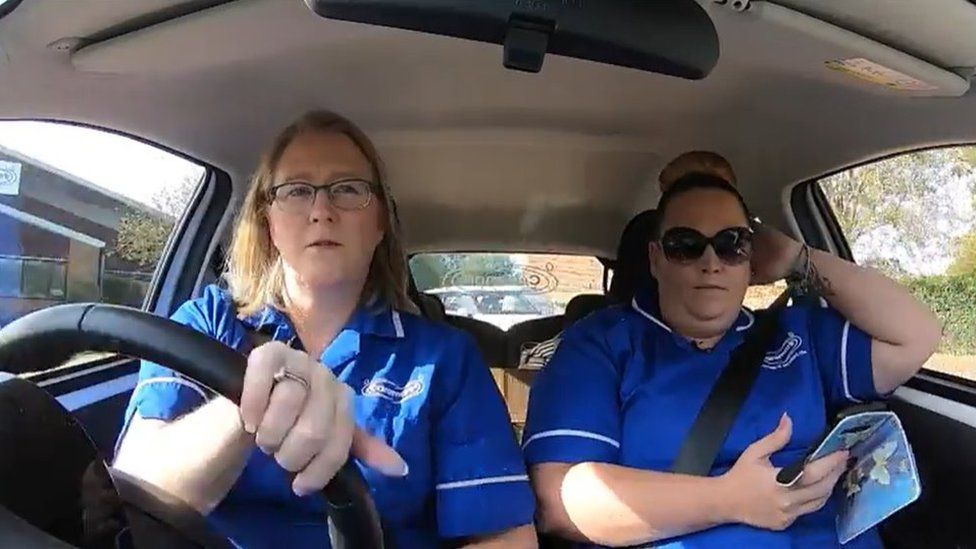A lack of care staff in the community leaves hospitals struggling to discharge patients.

Shortages of care staff, who support older or disabled people in the community, are causing major problems for hospitals, the BBC has learned.
NHS chief executives say rising numbers of patients are stuck in hospitals in England due to a lack of care staff.
The situation is “dire”, according to NHS Providers, which represents health service trusts.
The government says extra funding and a regular recruitment drive will help boost the care workforce.
Care companies are facing acute problems in recruiting and retaining staff, according to a report which suggests there are now more unfilled care jobs than before the pandemic.
The annual Skills for Care workforce report is based on data provided by a representative sample of employers of England’s 1.54 million care workers.
The researchers calculate that employers were failing to fill 8% of posts before the pandemic.
Figures obtained since suggest this had fallen to below 6% by June 2020 – but by August this year the trend had reversed with 8.2% of care sector roles unfilled.
This amounts to more than 100,000 posts with no-one to fill them, says Skills for Care.
Increasingly, care companies are forced to turn down work supporting patients as they move from hospital back to their own homes or care homes.
Those patients have to stay in hospital longer, putting more pressure on an NHS already struggling with Covid-19 and the waiting list backlog.
“We’ve just tipped over the point where delayed discharges are a bigger problem than Covid,” said one hospital boss who asked not to be named.
“Roughly 100 beds blocked and domiciliary care providers are handing dozens of [patient care] packages back to the council as they don’t have staff to deliver them,” said another.
A third manager had 140 patients ready to leave hospital, but the carer shortage meant “patients are dying in hospital when their choice was home, a hospice or nursing home”.
Just over 20 hospital bosses from across England responded to a BBC request for information.
The anonymous comments were gathered by NHS Providers, whose deputy chief executive, Saffron Cordery, said the delays are particularly worrying as winter is about to put extra pressure on services.
Not being able to leave hospital when they are ready can delay a patient’s recovery and rehabilitation, said Ms Cordery, while those waiting for treatment face backlogs.
“It’s vital that government delivers its commitment to place vital social care services onto a sustainable footing.”
She also highlighted the need for “crucially – a sustainable workforce, properly valued and respected for this vitally important work”.
Care companies say the main factors making it hard to find and keep staff are:
- burnout from the pandemic
- compulsory vaccinations
- higher pay available in other sectors as the economy picks up

In Sheffield, Tracey Hobson, a clinical manager at Northfield Nursing Home, says: “Recruitment is an absolute nightmare”.
“You wake up in the morning and you’re thinking, you know, I’m not going to be able to ensure that these people get the care that they deserve, and have enough staff to do it.”
Tracey says the sector faces a national staff shortage. She personally receives about 20 messages each day from recruitment agencies, desperate to hire her.
“You know, I’ve got a job. I’m looking after people to the best of my ability.”
In Buckinghamshire, Dr Kris Owden runs Caremark Aylesbury and is also a doctor who worked on hospital wards during the pandemic.
The firm pays relatively well and has managed to recruit enough new staff to replace most of those leaving but Dr Owden says they are still overstretched and have to refuse up to eight new people needing care each day.

“For us to be in this position before the winter, before the Christmas period is terrifying,” he said.
He says a properly resourced care system would take pressure off the NHS and wants to see carers paid better, with a proper career structure and recognition of their skills.
Among his senior staff, supervisor Charlotte Backhouse and manager Vicky Hartgill – who are both normally office-based – are having to step in and do front-line work.
On top of her regular job, Vicky worked through the weekend and on Monday had an 05:00 start. Although she loves seeing clients, she says she is “shattered”.

She added: “We need to be able to recruit, we need to be able to recruit in a safe way and just have a bigger workforce.
“We do have to pick up the phone and change times. We do have to be creative with the care that we provide – and until we can get some more people through the door to support us, that’s the way things will have to stay.”
A Department of Health and Social Care spokesman said: “We appreciate the dedication and tireless efforts of care workers throughout the Covid-19 pandemic and beyond.
“We are providing at least £500m to support the care workforce as part of the £5.4bn to reform social care.
“We are also working to ensure we have the right number of staff with the skills to deliver high quality care to meet increasing demands.
“This includes running regular national recruitment campaigns and providing councils with over £1bn of additional funding for social care this year.”

Do you work in a care home? Are you short-staffed and struggling to recruit? Share your experiences by emailing haveyoursay@bbc.co.uk.
Please include a contact number if you are willing to speak to a BBC journalist. You can also get in touch in the following ways:
If you are reading this page and can’t see the form you will need to visit the mobile version of the BBC website to submit your question or comment or you can email us at HaveYourSay@bbc.co.uk. Please include your name, age and location with any submission.